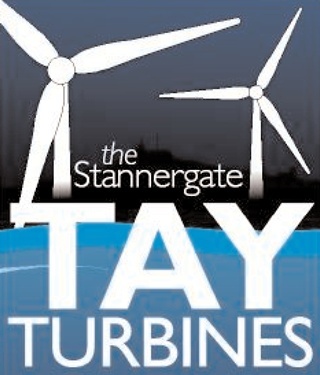The suggestion that Forth Energy could enter into a “one for you, one for us” scheme to sweeten the pill of its plan to build two wind turbines in Dundee has been knocked on the head.
Managing director Calum Wilson said he was aware of community schemes where a proportion of the output goes directly to benefit residents, but added, “We’re approaching this from a commercial development point of view and we are focusing on that.”
The plan to build two 127-metre turbines at Dundee harbour has attracted a storm of protest, with campaign group Residents Against Tay Turbines set up specifically to fight the proposal.
Mr Wilson said the turbines were an “emotive” subject.
Nevertheless, he added, they and the company’s proposed biomass plant at the docks will move Dundee and Scotland forward in terms of generating renewable energy, as well as tying in with aspirations to become a ‘sustainable’ city.
He said, “Our belief is that both have a part to play in terms of low-carbon energy production.”
Mr Wilson was speaking to The Courier in advance of the opening of an exhibition on the biomass plan, which will be at the Overgate on Friday and Saturday.
It will address issues raised by the public at a similar event earlier this year.
Mr Wilson said, “That was well attended and the feedback from those sessions held over three days in the Overgate was neutral to positive at that stage, in terms of investing in jobs, significant investment in Dundee and support for renewable energy generation.
“I understand that opinions will be mixed but I believe that it’s a viable proposal with several local benefits.”Jobs boostIn the short term construction of the power station will give the building industry a much-needed boost and operation of the plant will create around 40 jobs, he said.
The plant’s ability to supply heat could also attract new industries to the area.
The bulk of the biomass fuel would be shipped from overseas a fact that has led critics to question the plan’s green credentials.
In response Mr Wilson said that, even counting the carbon cost of transporting the fuel, the biomass plant would produce just 9-11% of the carbon emissions of a traditional coal-fired power station.
A planning application for the turbines will be lodged within the next few weeks and if there are no delays they could be in operation by 2012.
The longer construction time for the biomass plant means the earliest date it could be on stream is late 2015.
Mr Wilson said the design of the biomass plant would be “softened” by cladding and it would bear little resemblance to the power stations of old.
He said, “We want to work with the community and listen to their views and, where we can, reassure them.
“It’s a feature of investment in a significant development that some people will not view it as beneficial to the community as it will have an impact on the location around about it.
“I recognise that impact. Everyone has their views and I respect that.”
Mr Wilson added that the plans give Dundee the chance to stake a claim as a major player in the field of sustainable energy.
